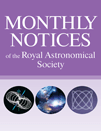
MONTHLY NOTICES OF THE ROYAL ASTRONOMICAL SOCIETY
Scope & Guideline
Unveiling the Mysteries of the Cosmos Since 1913.
Introduction
Aims and Scopes
- Astrophysical Phenomena:
The journal covers a broad range of astrophysical phenomena, from stellar formation and evolution to the dynamics of galaxies and clusters, including the study of supernovae, gamma-ray bursts, and black holes. - Cosmology and Structure Formation:
MNRAS publishes research related to cosmology, including investigations of the large-scale structure of the universe, dark matter, and dark energy, as well as the evolution of galaxies and the cosmic microwave background. - Planetary Science and Exoplanets:
Research on planetary systems, including the formation and dynamics of exoplanets, their atmospheres, and the conditions that may support life, is a significant focus of the journal. - Instrumentation and Observational Techniques:
The journal also emphasizes advancements in observational techniques and instrumentation, including new methods for data acquisition, analysis, and modeling in astrophysics. - Theoretical and Computational Astrophysics:
Theoretical studies and computational modeling of astrophysical processes are critical components, contributing to the understanding of complex systems and phenomena.
Trending and Emerging
- Machine Learning and Data Science Applications:
The integration of machine learning techniques in astrophysical research is rapidly increasing, with applications ranging from classification of celestial objects to predictive modeling of galaxy formation. - High-Redshift and Early Universe Studies:
Research focusing on high-redshift galaxies and the early universe is gaining prominence, driven by advancements in observational technology such as JWST, which allows for deeper insights into cosmic evolution. - Gravitational Wave Astronomy:
The field of gravitational wave astronomy is emerging as a significant area of study, with increasing interest in the implications of gravitational wave detections for understanding black hole mergers and neutron star collisions. - Complex Interactions in Galaxy Formation:
Studies examining the interplay between feedback mechanisms, gas dynamics, and star formation in galaxy evolution are becoming more prevalent, reflecting a shift towards more intricate models. - Multi-Wavelength Observations:
There is a growing trend towards combining data from various wavelengths (radio, optical, infrared, X-ray) to gain a holistic understanding of astrophysical phenomena.
Declining or Waning
- Traditional Stellar Evolution Models:
Research centered solely on classical stellar evolution without considering new variables such as magnetic fields or advanced computational techniques has decreased, as more complex models gain traction. - Single-Focused Studies on Local Galaxies:
There has been a shift away from studies focusing exclusively on local galaxies, with an increasing trend towards understanding cosmic evolution and high-redshift phenomena. - Static Models of Cosmic Structures:
Static models that do not incorporate feedback mechanisms or dynamic processes are less frequently published, as there is a growing recognition of the importance of interactions and environmental influences.
Similar Journals

Contributions of the Astronomical Observatory Skalnate Pleso
Fostering Discovery: Where Slovak Research Meets Global AstronomyContributions of the Astronomical Observatory Skalnate Pleso, published by the Slovak Academy of Sciences Astronomical Institute, serves as a vital platform for the dissemination of research in the realm of Astronomy and Astrophysics. With its ISSN number 1335-1842 and E-ISSN 1336-0337, this esteemed journal aims to foster scientific discourse and innovation among researchers, professionals, and students alike. Although it currently holds a Q4 quartile ranking in its field as of 2023, the journal encourages contributions that enhance our understanding of universe dynamics and celestial phenomena through rigorous research methodologies. Spanning from its inaugural year in 2007 to the projected continuation through 2024, it integrates local insights from Slovakia with broader international endeavors in astronomy. The journal promotes an open-access approach, providing scholars unrestricted access to valuable findings and discussions, thereby advancing the boundaries of astronomical knowledge.
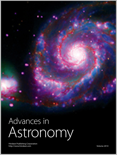
Advances in Astronomy
Exploring the Cosmos, One Discovery at a Time.Advances in Astronomy is a prestigious open-access journal published by HINDAWI LTD, dedicated to the field of astronomy and astrophysics. Established in 2008, the journal aims to disseminate significant research findings and advancements in the understanding of celestial phenomena, planetary sciences, and the intricate workings of the universe. With an impact factor that reflects its relevance in the scholarly community, Advances in Astronomy holds a commendable rank of Q3 in both Astronomy and Astrophysics as well as Space and Planetary Science categories, indicating its importance within these fields. The journal also showcases a commitment to open-access publishing, ensuring that research is readily available to both the scientific community and the public. Researchers, professionals, and students alike are encouraged to contribute to this dynamic forum to share knowledge and foster collaboration in exploring the wonders of the cosmos.
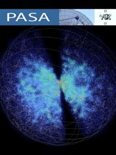
PUBLICATIONS OF THE ASTRONOMICAL SOCIETY OF AUSTRALIA
Unveiling the Mysteries of the Universe with Rigorous Research.Publications of the Astronomical Society of Australia, published by Cambridge University Press, stands as a distinguished platform for advancing knowledge in the realms of Astronomy, Astrophysics, Space, and Planetary Science. Hemmed in the United Kingdom, this journal is recognized for its outstanding contributions, reflected in its status as a Q1 journal in both Astronomy and Astrophysics, along with Space and Planetary Science categories as of 2023. With a solid impact factor, it ranks impressively at #23 within its Scopus category, firmly placing it in the competitive 75th percentile. This publication facilitates open discourse and innovative research from its inception in 1996 to the present year of 2024, providing an essential resource for researchers, professionals, and students eager to deepen their understanding of cosmic phenomena. By embracing rigorous peer-review standards and a commitment to scholarly excellence, the journal not only contributes to the scientific community but also fosters the next generation of astronomical research.
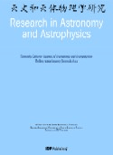
Research in Astronomy and Astrophysics
Bridging Global Perspectives in Astronomy and Astrophysics.Research in Astronomy and Astrophysics, published by the National Astronomical Observatories under the Chinese Academy of Sciences, stands out as a pivotal platform for disseminating cutting-edge research in the fields of astronomy and astrophysics. With an ISSN of 1674-4527 and an E-ISSN of 2397-6209, this esteemed journal operates as an open access publication, ensuring that high-quality research is available to a broad audience without any financial barriers. As of 2023, it holds a commendable Q2 quartile ranking in both Astronomy and Astrophysics, as well as Space and Planetary Science, reflecting its importance and revered position among leading journals. Spanning from 2009 to 2024, it is geographically rooted in the United Kingdom but engages a global readership and author base, making significant contributions to the rapidly evolving discourse in astrophysical studies. Moreover, its rankings in Scopus underscore its relevance, ranking 43rd out of 90 in Astronomy and Astrophysics and 61st out of 104 in Space and Planetary Science, placing it firmly within the competitive landscape of scientific research. Research in Astronomy and Astrophysics is dedicated to fostering innovation and communication within the scientific community, offering researchers, professionals, and students alike a valuable resource for collaboration and knowledge advancement.
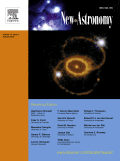
NEW ASTRONOMY
Innovating Research in the Realm of the StarsNEW ASTRONOMY, published by Elsevier, stands as a pivotal platform in the field of Astronomy and Astrophysics. With an ISSN of 1384-1076 and an E-ISSN of 1384-1092, this journal has solidified its reputation over its operational years, from 1996 to 2025. Located in the Netherlands, it ranks in the Q2 category for Astronomy and Astrophysics and Instrumentation, and Q3 for Space and Planetary Science, affirming its significant contribution to these disciplines. With a Scopus rank of #37/90 in Astronomy and Astrophysics and a respectable 59th percentile, this journal is essential for researchers and professionals seeking cutting-edge findings and methodologies. Although not open access, NEW ASTRONOMY remains dedicated to providing a rich repository of knowledge, featuring exceptional peer-reviewed articles that explore novel astronomical phenomena and advancements in instrumentation. Engaging with this journal will not only enhance your understanding of current trends in the cosmos but also contribute to the ongoing dialogue within these dynamic fields.

Astrophysical Bulletin
Your Gateway to the Latest in Astrophysical DiscoveriesWelcome to the Astrophysical Bulletin, an esteemed journal published by MAIK NAUKA/INTERPERIODICA/SPRINGER that has been contributing to the fields of Astronomy and Astrophysics since its inception in 2009. With a prominent Q3 rating in both Astronomy and Astrophysics and Instrumentation, this journal is designed to foster an understanding of astronomical phenomena through comprehensive research articles and groundbreaking discoveries. While currently not offering open access, it remains a vital resource for researchers and professionals looking to stay informed on the latest advances in the field, featuring a compelling selection of peer-reviewed studies that underscore its relevance and impact. The Astrophysical Bulletin ranks impressively in Scopus, making it a trusted platform for disseminating vital knowledge and new insights into our universe.

Galaxies
Pioneering research in the realm of stars and galaxies.Galaxies, published by MDPI, is a premier open-access journal dedicated to the vibrant field of Astronomy and Astrophysics. Established in 2013, with a strong commitment to making scientific research accessible, this journal has quickly garnered recognition, achieving a notable impact factor and ranking in the Q2 Quartile of its category as of 2023. With a Scopus ranking of #31 out of 90 in the domain of Astronomy and Astrophysics, and a commendable percentile rank of 66, Galaxies serves as a vital platform for researchers, professionals, and students engaged in astronomical studies and related fields, facilitating the dissemination and discussion of groundbreaking research. The journal covers a wide array of topics including galactic dynamics, cosmology, and observational astronomy, encouraging interdisciplinary collaboration and innovation within the scientific community. Located in Basel, Switzerland, and adhering to the highest publishing standards, Galaxies is committed to enriching the academic discourse in astronomy, making a significant impact on both current and future explorations of our universe.

PUBLICATIONS OF THE ASTRONOMICAL SOCIETY OF JAPAN
Exploring the universe, one publication at a time.Publications of the Astronomical Society of Japan is a prestigious, peer-reviewed journal dedicated to advancing the field of astronomy and astrophysics. Published by Oxford University Press, this journal provides a platform for high-quality research, fostering scientific communication among both established researchers and emerging scholars. With an ISSN of 0004-6264 and E-ISSN 2053-051X, it is recognized for its significant impact in its field, boasting a Q2 ranking in both Astronomy and Astrophysics and Space and Planetary Science as of 2023. The journal seeks to bridge traditional and innovative approaches to expand understanding of celestial phenomena, making it an essential resource for professionals, students, and researchers alike. Researchers can access a wealth of cutting-edge studies spanning theoretical and observational aspects of astronomy from its inception in 1996 to the present day. Although the journal operates under a traditional access model, it remains a respected forum for pivotal discoveries and discussions within the global astronomical community.

Open Astronomy
Bridging the Gap Between Research and the Cosmos.Open Astronomy is a pioneering journal dedicated to the expansive field of astronomy and astrophysics, published by De Gruyter Poland Sp. z o.o. since 2016. This Open Access journal aims to facilitate the dissemination of high-quality research and stimulate scholarly dialogue among researchers, professionals, and students on a global scale. With a commitment to fostering the accessibility of academic knowledge, Open Astronomy has established itself within reputable categories, achieving a Q3 ranking in Astronomy and Astrophysics and a Q4 position in Space and Planetary Science for 2023. The journal also ranks 66th out of 90 in the Astronomy and Astrophysics category and 84th out of 104 in Space and Planetary Science according to Scopus metrics, indicating its growing influence in the scientific community. Based in Warsaw, Poland, Open Astronomy invites contributions that explore novel discoveries, innovative methodologies, and theoretical advances in the field, making it a vital resource for anyone passionate about the cosmos.

SOLAR SYSTEM RESEARCH
Fostering Innovation in Space and Planetary ScienceSOLAR SYSTEM RESEARCH, published by Pleides Publishing Inc, offers a comprehensive platform for the exploration and dissemination of scientific knowledge in the fields of Astronomy, Astrophysics, and Space and Planetary Science. With its origins tracing back to 1969, this journal provides a vital resource for researchers and professionals seeking to deepen their understanding of the solar system's complexities, including planetary formation, extraterrestrial geology, and the dynamics of celestial bodies. Although categorized in the Q4 quartile for both relevant disciplines, SOLAR SYSTEM RESEARCH remains committed to publishing high-quality research that contributes to advancing contemporary scientific discourse. Dedicated to fostering collaboration and innovation, the journal is indexed in Scopus and adheres to rigorous academic standards, making it an essential resource for students and professionals alike pursuing the latest developments in solar system studies.